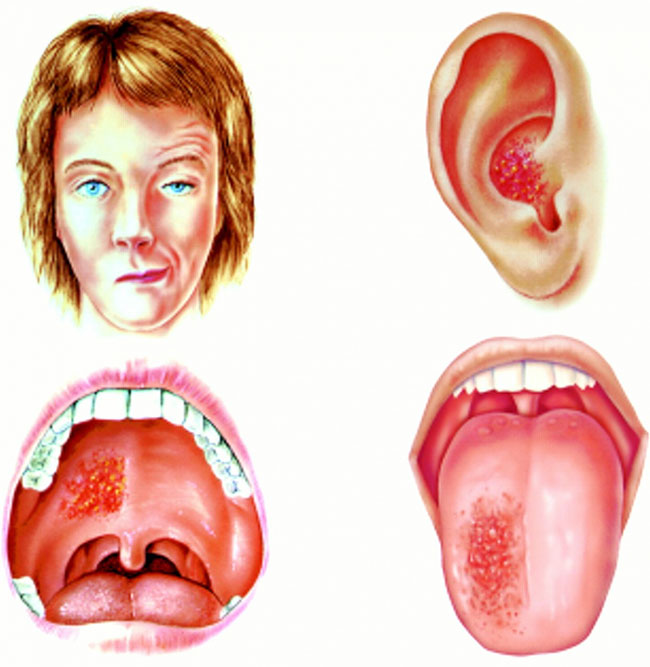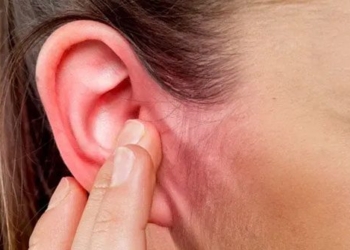You suddenly feel ear pain accompanied by blisters around the ear. You experience tinnitus and facial numbness. If you have these symptoms, you may be suffering from Ramsay Hunt syndrome.
Essential Information about Ramsay Hunt Syndrome
Ramsay Hunt syndrome (herpes zoster) occurs when there is an outbreak of shingles that affects the facial nerve controlling one side of your ear. In addition to the painful shingles rash, it can cause facial paralysis and hearing loss in the affected ear.
Ramsay Hunt syndrome is caused by the same virus that causes chickenpox. After recovering from chickenpox, the virus remains in your nerves. Many years later, it can reactivate, potentially affecting your facial nerve.
Timely treatment can reduce the risk of complications. Complications can include facial muscle weakness and permanent hearing loss.

This syndrome can cause paralysis on one side of the face and hearing loss.
Causes of Ramsay Hunt Syndrome
Ramsay Hunt syndrome occurs in individuals who have previously had chickenpox. Once you recover from chickenpox, the virus remains in your body—sometimes reactivating years later and causing shingles, which presents as a painful rash with fluid-filled blisters.
The syndrome is an outbreak of shingles affecting the facial nerve near one side of your ear. It can also cause paralysis on one side of the face and hearing loss.
Symptoms
The two main signs and symptoms of Ramsay Hunt syndrome are:
- Rash with painful blisters around and in your ear.
- Weakness or numbness of the facial muscles on the same side as the affected ear.
Typically, the rash and facial paralysis occur simultaneously. Sometimes one symptom may appear before the other. In some cases, patients may only experience facial paralysis without a rash.
If you have Ramsay Hunt syndrome, you may also experience the following symptoms:
- Ear pain
- Hearing loss
- Tinnitus
- Difficulty closing one eye
- Feeling of spinning or swaying (dizziness)
- Altered taste or loss of taste
- Dry mouth and dry eyes
When to See a Doctor
Call a doctor if you experience facial paralysis on one side or a shingles rash on your face. Treatment started within three days of the onset of signs and symptoms can help prevent long-term complications.
Risk Factors for Ramsay Hunt Syndrome
Ramsay Hunt syndrome can occur in anyone who has had chickenpox. It is more common in older adults, particularly those over 60 years of age. This syndrome is very rare in children.
Ramsay Hunt syndrome is not contagious. However, the reactivation of the varicella-zoster virus can cause chickenpox in individuals who are exposed to the fluid from the blisters or who have not been vaccinated. The infection can be severe for those with immune system issues.
Until the blisters have scabbed over, avoid contact with:
- Individuals who have never had chickenpox or have never been vaccinated against chickenpox.
- Individuals with weakened immune systems.
- Infants.
- Pregnant women.
Complications
Complications can include:
- Permanently hearing loss and facial muscle weakness. For most patients, hearing loss and facial paralysis due to Ramsay Hunt syndrome is usually temporary. However, it can become permanent.
- Eye damage. The facial weakness/paralysis caused may make it difficult to close your eye completely. When this occurs, the cornea, the protective structure of your eye, can be damaged. This damage can lead to pain and blurred vision.
- Nerve pain. This pain occurs when the shingles infection damages nerve fibers. The signals sent by these nerve fibers become disrupted and amplified, causing pain that may persist after other signs and symptoms have resolved.
Diagnosis
Doctors can often diagnose Ramsay Hunt syndrome based on medical history, clinical examination, and the specific signs and symptoms of the condition. To confirm the diagnosis, a doctor may take a fluid sample from one of the blisters in your ear for testing.
Treatment
Timely treatment of Ramsay Hunt syndrome can alleviate pain and reduce the risk of long-term complications. Medications may include:
- Antiviral medications. Drugs such as acyclovir (Zovirax), famciclovir (Famvir), or valacyclovir (Valtrex) are often effective against the varicella-zoster virus.
- Corticosteroids. A short course of high-dose prednisone can enhance the effectiveness of antiviral medications in treating Ramsay Hunt syndrome.
- Anti-anxiety medications. Drugs such as diazepam (Valium) can help reduce dizziness.
- Pain relievers. The associated pain can be severe, so a doctor may need to prescribe pain relief medication for patients.
Lifestyle and Home Remedies
The following can help relieve discomfort from Ramsay Hunt syndrome:
- Keep the affected areas clean.
- Apply cool compresses or wet dressings to the rash to alleviate pain.
- Use over-the-counter pain relievers or anti-inflammatory medications, such as ibuprofen (Advil, Motrin IB, etc.).
- If facial weakness/paralysis makes it difficult for you to close your eye, take the following steps to protect your vision:
- Use moisturizing eye drops throughout the day if your eye is dry.
- At night, apply ointment to your eye and tape your eyelid shut or wear an eye patch.
Prevention
Children are currently being routinely vaccinated against chickenpox, significantly reducing the likelihood of contracting the varicella-zoster virus. A shingles vaccine is also recommended for individuals aged 50 and older.
The symptoms of the disease can be subtle and mild, such as a dull ache in the ear accompanied by a few blisters. However, they can also be severe, presenting as facial muscle weakness and tinnitus, along with hearing loss. Therefore, do not be complacent; consult a doctor if you experience symptoms suggestive of Ramsay Hunt syndrome.





















































